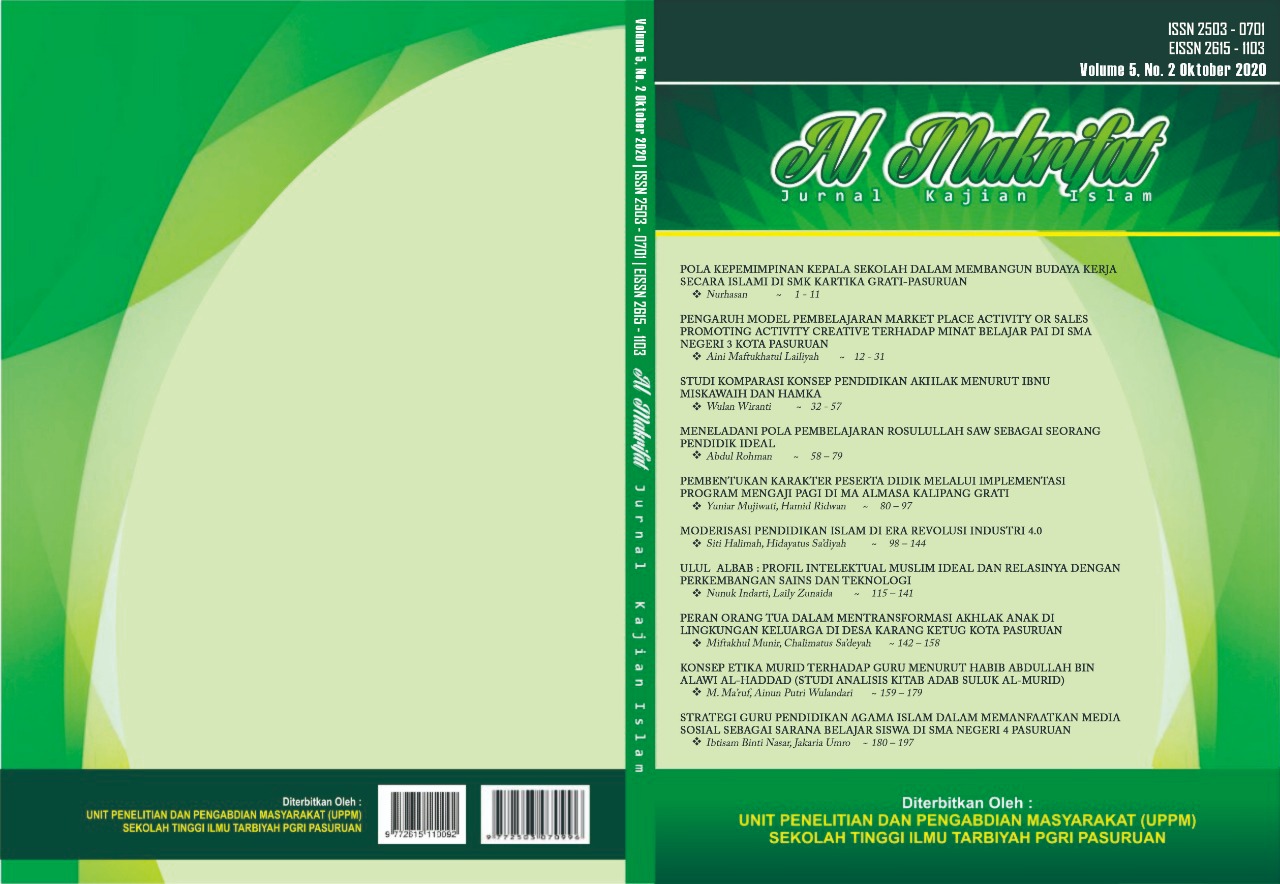Peran Orang Tua Dalam Mentransformasi Akhlak Anak Di Lingkungan Keluarga Di Desa Karang Ketug Kota Pasuruan
Abstract
Every child has the right to receive education, especially moral education, because with moral education a child will know what is good and what is bad, parents play an important role in the process of providing moral education.However, in the process of moral education it is very much influenced by the environment and peers. Therefore, there must be a role for parents and the surrounding community to support the children's morals. This study aims to describe moral education in Karang Ketug village, to describe the role of parents in transforming children's morals in the family environment, to describe the inhibiting factors and driving factors of parents in transforming children's morals in the family environment. This research is a qualitative descriptive study. The subjects of this study were parents. Data collection methods in this study are observation, interviews, and documentation. Sources of data used in this study are primary data sources and secondary data sources. The results obtained from this study 1) Moral education in Karang Ketug village, Pasuruan city, namely the state of moral education in this village, there are good and bad moral education, it is said to be good because there are still many parents who care about their children's morals so that parents act by sending their children to school. at the pondok or at the madrasa school. And it is said to be bad because parents are busy working so they don't care about letting their children play freely without parental monitoring. 2) The role of parents in transforming children's morals in the family environment is very important and the method most often used by parents in transforming children's morals is the imperative method, the prohibition method, the habituation method. 3) The supporting factors, namely the bad environment make parents motivated to emphasize moral education for their children, parents want to equip a child with moral education so that they can be integrated with society, and parents want their children to be better. and inhibiting factors, namely bad environmental factors, friends or colleagues, social media and mobile phones and bad children's attitudes.References
Nata, Abuddin. 2005 Filsafat Pendidikan Islam. Jakarta: Gaya Media Pratama, 2005.
Al- Rosyidin, Samsul Nizar. 2000. Filsafat Pendidikan Islam : Pendekatan Historis, Teoritis Dan Praktis. Jakarta: Ciputat Press.
Ali Jumbulati dan Abdul Futuh Tuainisi. Perbandingan Pendidikan Islam. Jakarta: Rineka Cipta.
Arifin. 2008. Ilmu Pendidikan Islam. Jakarta: PT. Bumi Aksara.
Arifuddin, Arif. 2008. Pengantar Ilmu Pendidikan Islam. Jakarta: GP Press Group, 2008.
Budiman. 2012. Etika profesi guru. Yogyakarta: Mentari Pustaka.
Departemen Agama RI. 2003. Pegangan Orang Tua. Jakarta: Direktorat Jendral.
Hartono, Ahmad Jaiz. 2010. Sumber-sumber penghancur akhlak islam. Jakarta: Pustaka Nahi Mungkar, cetakan I.
Helmawati. Pendidikan keluarga teoretis dan praktis. Bandung: PT. Remaja Rosdakarya Offset.
Jack, C, Ricards. 1999. Longman Dictionary Of Language Teaching And Appied Linguistics. Kuala Lumpur: Longman Group.
Lexy Moleong. 2011. Metode Penelitian Kualitatif. Bandung: PT Remaja Rosda Karya.
Mustofa A. 2014. Akhlak Tasawuf. Bandung: CV. Pustaka Setia.
Nana Sudjana, Ibrahim. 1984. Penelitian Dan Penilaian Pendidikan. Bandung: Sinar Baru.
Nana Syaodih, Sukmadinata. 2009. Metode Penelitian Pendidikan. Bandung: PT. Remaja Rosdakarya. Cet. X.
Nik Haryanti. 2014. Ilmu Pendidikan Islam. Malang: Gunung Samudera.
Nur Uhbiyati dan Abu Ahmadi. 1998. Ilmu Pendidikan Islam. Bandung: Pustaka Setia.
Nurul, juriah. 2006. Metodologi Penelitian Sosial Dan Pendidikan: Teori Dan Aplikasi. Jakarta: Bumi Aksara.
Rudi, Ahmad Suryadi. 2012. Ilmu Pendidikan Islam. Yogyakarta: CV. Budi Utama.
S. Margono. 2005. Metodologi Penelitian Pendidikan. Jakarta: Rineka Cipta, Cet V.
Soejono Soekanto. 2002. Sosiologi suatu pengantar. Jakarta: Raja Grafindo Persada.
Suharsimi Arikunto. 2002. Prosedur Penelitian Suatu Pendekatan Praktek. Jakarta: PT. Rineka Cipta. cet. XII.
Suratno, Arsyad Lincoln. 1995. Metodologi Penelitian Untuk Ekonomi Dan Bisnis. Yogyakarta: UPP AMPYKPN.
Sutari dan Imam Barnadib. 1995. Model-Model Pola Pendidikan Anak.
Tim Dosen PAI. 2016. Bunga Rampai Penelitian dalam Pendidikan Agama Islam. Yogyakarta: Deepublish.
W, Mantja. 2003. Etnografi Desain Penelitian Kualitatif Dan Manajemen Pendidikan. Malang: Winaka Media.
WJS. Poerwo Darminto. 1982. Kamus Umum Bahasa Indonesia. Jakarta: Balai Pustaka.
Zuhairini. Filsafat Pendidikan Islam. Jakarta: PT. Bina Aksara.




